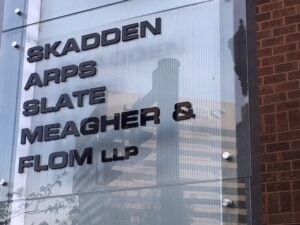(Image via Getty)
It’s the most wonderful time of the year (all things considered). Thanks to a bonanza of bonus news, the holiday season is off to a great start. Cravath was very merry this year, stuffing associates’ stockings with good cheer and wads of cash. Thanks to the pandemic, law firm holiday parties will likely be pushed onto Zoom, but the virtual celebrations and hefty paychecks pale in comparison to what’s about to get underway: Above the Law’s twelfth annual holiday card contest. We’ve already received several emails asking about when this year’s contest would start. The answer: It starts today.
We are a legal website, so of course there are some rules to follow:
1. Because we are committed to the environment here at Breaking Media, we will consider ONLY E-CARDS. Please don’t send us paper holiday cards via snail mail this year — the Above the Law editorial team hasn’t been in our physical office since March 2020.
2. To submit an e-card, please email either a link to the card or the card itself (as an attachment) — but note that WE PREFER LINKS, if available — to tips@abovethelaw.com, subject line: “Holiday Card Contest.” The subject line is very important because it’s how we will comb through our inbox to collect the entries when picking finalists. If you don’t use the correct subject line, expect a lump of coal in your stocking.
3. Please limit submissions to holiday / Christmas cards that you view as WORTHY CONTENDERS. We’re looking for cards that are unusually clever, funny, or cool; we’re not interested in cards that are safe or boring (e.g., a beautiful winter landscape, a “Happy Holidays 2020,” and the law firm name). We’re seeking cards with some attitude, with that extra je ne sais quoi. If you send us a banal card, don’t be surprised if we make fun of it.
4. In your email, please include a BRIEF EXPLANATION of why this card is compelling — an explanation that we MIGHT QUOTE FROM if your nominee makes the finals (if you want to be anonymous, let us know). If you can’t offer an explanation, please rethink whether the card is a worthy contender (see rule #3, supra).
5. The deadline for submissions is about two weeks from today: FRIDAY, DECEMBER 11, at 11:59 p.m. (New York time). No exceptions. If you’re reading this post after the deadline, then you don’t read Above the Law frequently enough.
We look forward to your submissions. Thank you, and happy holidays!
 Staci Zaretsky is a senior editor at Above the Law, where she’s worked since 2011. She’d love to hear from you, so please feel free to email her with any tips, questions, comments, or critiques. You can follow her on Twitter or connect with her on LinkedIn.
Staci Zaretsky is a senior editor at Above the Law, where she’s worked since 2011. She’d love to hear from you, so please feel free to email her with any tips, questions, comments, or critiques. You can follow her on Twitter or connect with her on LinkedIn.




 Kathryn Rubino is a Senior Editor at Above the Law, and host of
Kathryn Rubino is a Senior Editor at Above the Law, and host of 






 Jordan Rothman is a partner of
Jordan Rothman is a partner of 


 Tom Kulik is an Intellectual Property & Information Technology Partner at the Dallas-based law firm of
Tom Kulik is an Intellectual Property & Information Technology Partner at the Dallas-based law firm of 
 Olga V. Mack is the CEO of
Olga V. Mack is the CEO of